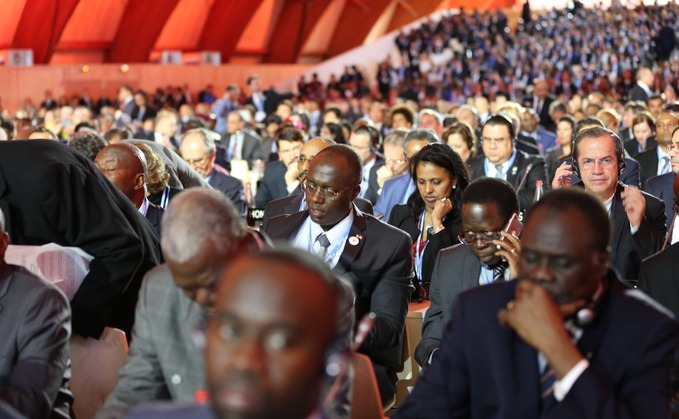
Diplomats gather at COP21 in Paris back in 2015
The stakes for the Glasgow Summit could hardly be higher - politicians, businesses, and the public should be cognizant of the genuinely historic importance of COP26
How important is COP26? There is an understandable desire to resist the modern impulse to rank and categorise any and all events, to hyperbolically attach 'historic' to pretty mundane occasions, to promote the moderately impressive to full blown GOAT-status. We are living in an age of inflationary event significance.
And yet, you can still make a case for COP26 being one of the most important Summits in human history. The stakes are that high, the potential outcomes that era-defining. From businesses to journalists to the politicians taking part to the wider public, the gathering deserves due care and attention.
The first thing to consider is that the Glasgow Summit will be one of the biggest logistical undertakings of modern times. Among the tens of thousands of delegates will be scores of world leaders, who will inevitably necessitate the biggest security operation since the London Olympics. A gathering that would be difficult to coordinate at any time has been further complicated by the need to manage covid risks and enable vaccine access for delegates.
These costs have been borne and the calls for further postponement resisted because the meeting matters so much.
Of course, by definition every climate summit matters more than the last because with each year that passes emissions keep rising and the task of keeping temperature increases below 1.5C becomes ever harder. But the way in which the Paris Agreement ushered in five year review cycles that would culminate in calls for countries to upgrade their decarbonisation plans makes COP26 more important than any Summit since the Paris meeting of 2015.
Add in the fall out from the coronavirus pandemic, the victory of Joe Biden, and the rapid advance of clean technologies and net zero strategies since the Paris Accord was signed, and you can see how Glasgow really could trigger a step change in global decarbonisation efforts.
And such a step change is urgently needed. There is no firm deadline for climate action - 1.5C is better than 2C, which is better than 3C, which is better than 4C - but it is still true that without a genuinely world historic peaking of global emissions within the next few years it will become all but impossible to keep temperature levels below the goals agreed in Paris. And, as scientists have repeatedly warned, beyond those goals the risk of global catastrophe lies. There be dragons.
Some will argue that COP26 and the entire UN negotiating process is a sideshow to the main event of global decarbonisation. That it amounts to a self-serving caravan, locked away from the real world where businesses and investors will get on with the serious work of driving down emissions while diplomats and politicians talk.
But the Paris Agreement revealed the lie contained in that dismissive analysis. That accord defied the sceptics - President Trump amongst them - by providing the market signals that then triggered the global wave of net zero strategies that now cover two thirds of the global economy and, according to the IEA's latest landmark report today, could bring the global warming trajectory down to 2.1C.
If the Glasgow Summit delivers on the priorities set out by the British government - a finalisation of the Paris Agreement's rulebook; the mobilisation of $100bn a year of climate finance, including action on climate resilience; net zero targets and strategies from every major emitter; and real world action on coal, cash, cars, and trees - then the market signals set off in Paris will become deafening for businesses and investors everywhere. You'll see the results from space - literally.
As the IEA noted today, the fossil fuel business could become a sunset industry by 2025 as demand peaks and clean technologies start to dominate. Glasgow could effectively lock in that progress and help ensure net zero becomes a reality.
That is how important COP26 is. And once you start to unpack what is at stake you quickly come to the question, what is more important? This is the pinaccle of international co-operation, the zenith of multilateralism. A genuine attempt by every country on the planet to sustain the only life-support system available to humanity and reverse the existential damage that is being done to the biosphere.
It may seem like hyperbole, but think through the implications, the scale of the opportunity, and the potential repercussions if it all goes wrong, and the summit to save the world moniker is well deserved.
A version of this article originally appeared in the BusinessGreen Overnight Briefing newsletter, which is available to all BusinessGreen subscribers.










